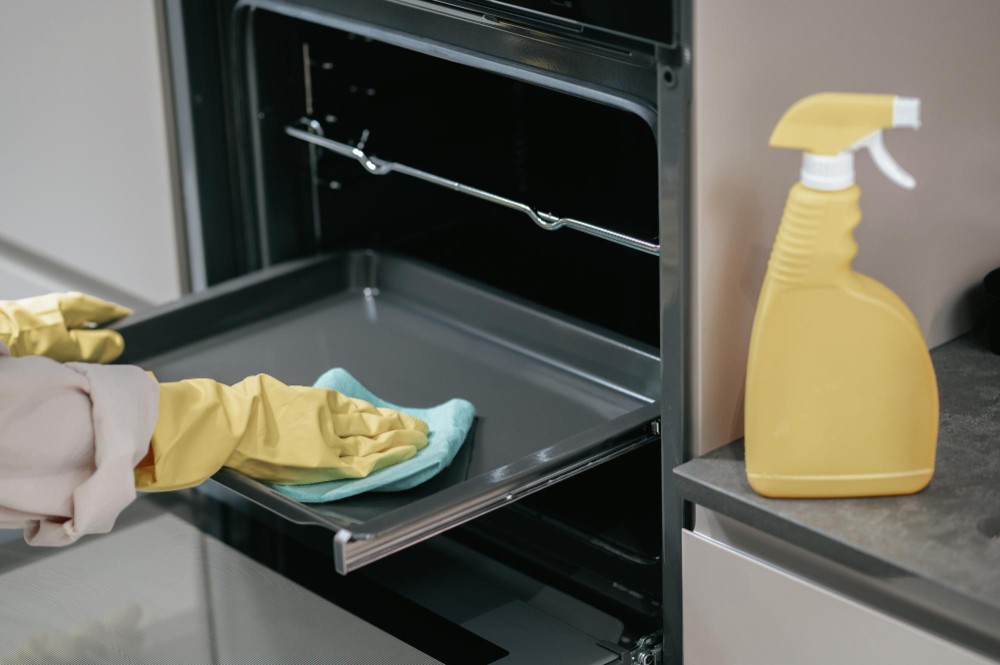Among the most feared chores in the kitchen is cleaning the oven. We pushed it off if we could, fearing the scrubbing away of grease and accumulated residue and the removal of burnt bits of food. This, however, does not have to be the case. Cleaning the oven is difficult, but it may be made more accessible and more comfortable. And the result is a gleaming clean oven that seems like it was well worth the effort.
When faced with such an unpleasant task, it’s tempting to wonder why you need to clean the oven. However, filthy ovens can be hazardous, resulting in the following consequences:
- Highly visible discolorations.
- Damage to oven’s interior, including the base and trimmings
- Unsightly grime on the window
- You produce a ton of smoke when using the oven
- Your home is exposed to a higher risk of fire
- Your oven’s life is shortened
As you learn how to deal with the gunk that eventually accumulates inside ovens, you will also learn – does oven cleaner ruin stainless steel? There’s also the issue with using specific household cleaners that may not be all that grand for your oven (can you clean an oven with bleach?) Finally, take note of the risks of using the wrong oven cleaner as these can destroy the aluminum trimming found inside modern evens.
Cleaning with Caution: Navigating Alkaline and Caustic Oven Cleaners
Because most oven cleaners are alkaline like ammonia, they have a lot of ability to break through thick grease and filth. But, of course, considerable caution is required when using oven cleaner at the very top of the alkaline scale.
Tub and tile cleaning is another alkaline product that effectively eliminates dirt and grime but is caustic. Use caution and ventilate the area where you’re cleaning the tub and tiles.
Baking soda, like Vinegar, is an alkaline chemical. But only just. Baking soda has just enough alkalinity to cut through oil and filth but not enough to be caustic so that it can be used in various applications around the house.
For neutrality, mild dish soap is usually a good choice. If your dish soap is labeled light, gentle, or suitable for hands, the pH level is likely to be around 7. Dish soap is ideal for everyday cleaning because of its mildness. Dish soap won’t harm most surfaces, and it can be used in a variety of places other than the kitchen sink. On the other hand, Vinegar is on the opposite extreme of the pH range. Vinegar is acidic, which makes it excellent for dissolving mineral deposits, but it can also cause harm to some surfaces, including stone. Many people believe that Vinegar is an all-purpose cleaner. However, surfaces that acids can damage are not excellent choices for vinegar cleaning.
The Science Behind Alkaline Oven Cleaners and Their Effectiveness
Many people are afraid of the substances used in oven cleaners, but do they deserve their bad reputation? Unfortunately, oven cleaning’s hardships and tribulations are a necessary evil that most of us must endure.
As a result of cooking, various layers of grime, sludge, and baked-on crud can build up inside your oven over time, and some of this debris can even contribute to rust. Chemical oven cleaners are genuine specialists in cutting through grease buildup, but they do have their own set of problems.
Oven cleaners contain hazardous chemicals that can injure you if consumed or come into touch with your skin. Is this, however, a reason to avoid using them? Oven cleaners are alkaline solutions, ranging in pH from 11 to 13. This is because alkalis are good at cutting through all of the filth and sludge that builds up inside an oven.
In addition, alkalis saponify fats into soaps, which are then more easily dissolved in water.
Stronger oven cleansers with a higher alkaline pH can be utilized when grease buildup is significant. Caustic soda solutions are excellent in these scenarios due to the high pH of this chemical (about 14). However, use caution while using these solutions because high-alkaline oven cleansers can cause skin irritation and even chemical burns.
Protect Your Loved Ones with Safe Oven Cleaning Practices
Oven cleaners contain industrial chemicals that should never be mixed with food directly. Oven cleaners should always be considered a poison and kept away from pets and children.
These cleaning products can cause serious injury if swallowed or when it meets your skin accidentally. Remember to wear gloves when cleaning your oven! Alkaline solutions with pH values from eleven to thirteen have similar cleaning and oil-stripping effects on their environments.
The oil-stripping effects are because alkalis are highly effective in removing the sludge and oil buildups that accumulate inside an oven; alkalis are also well-known for saponifying animal lipids, which makes oven cleaners easily dissolvable in H2O.
Balancing Harshness and Efficiency: The Ideal Abrasive Particle Size for Cleaning
Most typical household cleaning products contain detergents, acids, alkalies, solvents, and sanitizers usually derived from alcohol or rubbing alcohol. Kitchen cleaners are primarily alkaline, like oven cleaners.
Abrasives are materials that remove dirt from surfaces by rubbing them. Abrasives such as rottenstone, volcanic ash, quartz, and silica are all examples of natural materials used as abrasives. In addition, abrasives include sandpaper, plastic and nylon meshes, and steel wool, among other things.
Scouring powders and pads contain abrasive ingredients such as calcium carbonate, which is very effective. However, in general, the larger the size of the abrasive particles, the harsher the cleaner will be in comparison.
This is because an abrasive with the most acceptable particle size is made of plastic or nylon mesh, and the more refined the particle size, the less harm is done to the surface being cleaned.
Coarse abrasives have a rough and gritty feel to them. The term “abrasive” is rarely used on the labels of containers containing abrasive powders; instead, they are referred to as “cleansers,” as opposed to the more commonly used phrase “cleaner.”

